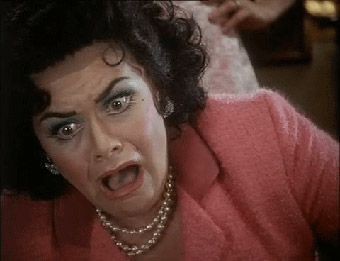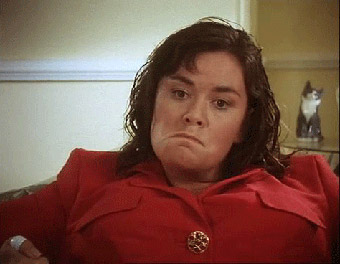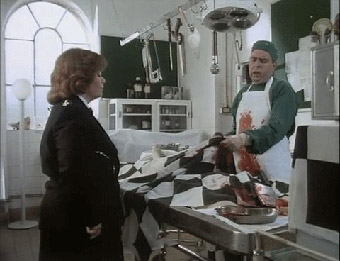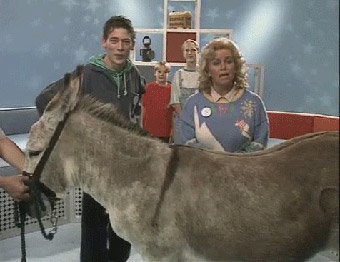| |
"What is the secret of good comedy? Spiers gives the enquiry some thought. And some more. 'Well, if you think a gag isn't going to work, shoot it separately, so you can have a second go at making it work in the editing. If it still doesn't work, at least it's removable. Beginners take note." |
| |
Interview with TV Director Bob Spiers
in The Independent, 7th January 1993 |
Bob Spiers should know what makes good comedy. He directed the second series of six Fawlty Towers. It is germane to note that even BBC commissioning executives reacted very mutely when Cleese submitted his first season scripts. Spiers' credit list puts him front and centre on the outskirts of and in-skirts of TV comedy. I was surprised to see so many terrific Comic Strip Presents films on his CV, stuff 'film-style'-wise miles away from studio bound sitcoms. So a constantly busy and eminently employable comedy director has an eye for a good script, a talent for visual flair and more importantly (which is why most 'Makings Of' are so gushy) he/she must have great skill in dealing with people. Making Film and TV drama is quite unlike any other profession in that it encourages close relationships to be established between virtual and real strangers very quickly, and that the work should flow from the trust this engenders.
I once shot a nervous non-actor in a reconstruction and soothed him with the simple words "I won't allow you to come across as embarrassing." He was calmed not realising that I would be the one who looked ridiculous if I let him look the same. Being compatible with just about every type of human being is 60% of TV work if you want to keep earning. No one wants to spend their time with dislikeable people unlike in the movie industry in which this behaviour has a perverted artistic cachet – like the absurd idea that good art cannot be made by those without membership cards of the Complete And Utter Bastard Club. So Spiers had his comedy credentials in place, eminently qualified to turn funny scripts into funny TV shows. And with his directorial stamp on five of the six of series one of Murder Most Horrid, I sat down thinking I'm in good hands. And yet...

From the commentaries, it's obvious that this early 90s single camera sitcom is lovingly remembered. All six were shot on 16mm film rather than in a studio with multiple cameras that meant at that time, the series had some sort of budget. It's obvious that this affection extends towards the episodes themselves and as a six part snapshot of what was on the UK's mind in 1991 (or at least on the writers' minds at that time) it's a curious trove of national Geist of Zeits. But is it funny? In 2008, is there an audience out there who can appreciate this series without it being a fondly remembered slice of one's past? I didn't catch it when broadcast (and yet I was devouring all The Comic Strip movies) but feel on this viewing that the comedy is not sharp enough to be appreciated seventeen years on. There's something cloyingly secure and traditional about all the episodes and the word 'twee' keeps knocking on my skull. The humour (and indeed murders) are safer than a bouncy castle with a 'one at a time' policy. Each of the six 30 minute episodes is based around a murder (that was about the extent of the writers' remit I think). Given this we have two police shows, a time travel fantasy, a tale of a Spanish maid who wreaks revenge on English developers raping her homeland, a Blue Peter spoof and a doppleganger story. And yes, how come the Germans have a word for exact human double and we don't?
So, it's all down to Dawn. How much of a fan of Ms. French do you have to be to appreciate Murder Most Horrid? A pretty rabid one, methinks. We are Dawn French fans in this household. Aside from all the Comic Strip Presents (and who can forget her psychotic take on Mrs. Danvers in the Rebecca parody Consuella?), French has popped up in several shows that I've come to appreciate except her most famous one and that says more about me than her. Her schizophrenic Rosie in the gently but definitely subversive Jam and Jerusalem is a terrific character blessed with a dark side that normally we don't get to taste in this sort of character or indeed this sort of comedy. Even her witless beer-loving mother in Lark Rise To Candleford requires a mention. She plays unintelligent very convincingly which is not to say the actress shares this character trait. I remember barking with laughter at the French and Saunders comedy sketch in which Dawn had worked out what actually happens when a man and a woman have sex. She will be forever linked with that flapping mime she did (the fish that come out of the lady) and spill out all over the floor. The only time I smiled in three hours of Murder was French eating an oyster (plus the shell). That's a bit 'not right' for a comedy series, isn't it?

Of course, it's French's long running Vicar of Dibley that I am unable to watch. It takes twee to stretching point (that's 'twee' with about sixteen 'e's) and presents a view of England that's almost Dadsarmian, a look at what middle England and those Daily Mail readers still think passes for this country. How do I know this if I haven't seen it? You've got me. I have made a gross generalisation but one which may be true. Dibley fans, let me have your heads to my tails. I'll cover each of the episodes in the notes on each commentary (except for the commentary-less Murder At Tea Time which is essentially French as a demented Valerie Singleton on a Blue Peter show, pissed at the rising starriness of her co-star).
A few further notable items: I once knew an assistant director called Trevor Puckle (it's one of those names you don't really forget). His most memorable place in my mind was during a film shoot we both worked on. His attempts at bringing refreshment down a cliff to a crew who had been trained to freeze when the star was on the loose are highly memorable. The star was an animal that, if so inclined, could pull your arms off in a temper tantrum. (It was a chimpanzee if anyone's curious). Poor Trevor got roundly attacked and proudly showed his bruises the next day. But it may have been the funniest thing I've ever seen, a grown man trying not to spill fourteen Styrofoam cups of coffee while being assaulted by a pissed off chimp. Maybe you had to have been there. Well, Trevor made an impression. He's one of the authors on a bookcase introduction to each Murder episode (they change the books per each episode). It was no coincidence. Trevor's there on the crew roster.
Set dressers rarely get pulled up short but each time we see a computer (with the exception of the time travelling episode), it is the same Macintosh LC with that distinctively shaped CRT monitor. It's not even on even when Jane Asher is planning her life with it. Odd to see so many thespians who developed careers if not given birth to by Murder Most Horrid but certainly the series is a body of work which helped their CVs swell. Ben Miller, the bloke in charge of Primeval's HQ, turns up as a young copper with barely a sentence of dialogue and his commander is played by Kevin McNally. I struggled with that youthful face before the commentary gave it away – he's Jack's master of the Pearl in Pirates of the Carribean.
So essentially, if you're a fan from the past or a French aficionado, then by all means add this to your collection but I don't think the series is going to blow too much of a squall in 2008's comedy climate.
The 4:3 16mm originated picture is relatively soft as befits its celluloid origins and there's a fair smattering of grain – Mmmm, film grain. But the print or cut negative from which the DVD was scanned (or even a master tape more than likely) is very clean.

The Dolby 2.0 basic soundtrack is fine (no problems understanding the actors or commentary participants).
Commentaries
The Case of the Missing
Nice title. Ian Hislop and Nick Newman (writers) discuss their twin obsessions of that time, namely and respectively, the Masons and Nanette Newman. It's an entertaining trawl through a writing partnership that seems easily recalled and quaintly remembered after 17 years. One nice aspect is Hislop (now exceedingly well known as the less hairy one on Have I Got News Without Angus takes a stab at defending that which he took the piss out of all those years ago. Hislop is the establishment's jester (as editor of Private Eye, he'd better be) as well as a member of same, logically funny and intelligent to a fault. Newman (I think) is best known as a comic actor from The Mary Whitehouse Experience, the puppy faced, floppy haired fellah. Again, it's a nice ramble but I'm just not sure how funny their efforts were. Time is a nasty master of us all.
The Girl from Ipanema
Dawn French & Sophie Clarke-Jervoise (assistant producer who rose to producer status throughout the series' four season run) leave the recording 16 minutes in (we're not told what had to take them away). This is, essentially, two girls having a memory party. It's entertaining enough and more shallow than a dirty frying pan but there's too much "Oh, listen to how bad that Spanish accent is..." stuff which is only just about OK in terms of entertainment value. They do, however, have a go at Dawn French's gurning – or as she calls it, mugging. This woman can keep pace with Jim Carrey as far as rubber facing is concerned. It reaches a sort of demented plateau in Mrs Hat and Mrs Red (French does "I'm happy I've been accepted" as a sort of eating your own face action. It's so over the top, you fear for her eyes).
He Died A Death
Ian Hislop and Nick Newman (writers) again decrying their use of pantomime reflex gags within their play within a play murder plot. It's diverting enough and both are full of praise for Dawn French's star status and comic ability. They also remind us how the brightest stars attract others which is why this series contains almost every well known and upcoming actor the UK had to offer.
A Determined Woman
Writer/director James Hendrie joins Dawn French and Sophie Clarke-Jervoise (one assumes they can stay to finish this show as it would be rude to walk out on the writer/director...). Jim Broadbent comes in for a lot of comment (mostly because he looks unnaturally young and plays the buffoon with some relish). "These characters would shop at Waitrose," says French in defence of the two bags prominently in the kitchen for a lot of screen time. The Guardian also gets a nod.
Murder at Tea Time
Curiously, no Commentary on this Blue Peter piss take.

Mrs. Hat and Mrs. Red
French and Clarke-Jervoise again on the commentary duties with James Hendrie (writer only). French is able to see her own acting style as being over the top (which is refreshing). Mrs. Mug! One can hardly miss it. "Oh my God, I've got a waist!" she exclaims. I wanted to get through this whole review without mentioning French's body shape (damn) or her marriage to Lenny Henry (double damn). But her weight is so often remarked upon (not least by French herself) that it almost defines her – which is a shame. Again, we only have 15 minutes of French and Clarke-Jervoise. What are these people saying to the DVD distributors? "Yes, I'll do the commentary but only for half of each episode..." Weird. French cites 'lunch' as a reason but it still seems so odd. Very time poor, these creative types.
Photo Gallery (1:54)
Again, what's the point of this feature? Just to buck up the Extras quotient?
Credits (0:54)
Main cast and crew credits per episode.
If you adore Dawn French or appreciate over-acting and Olympic class mugging and gurning or are curious about how almost 90% of English thespianic talent spent their 1991, then this DVD is for you. Low on good solid laughs, high on whimsy and gurning, Murder Most Horrid is inescapably twee, trapped in time and given the talent on display, it's curiously unmoving.
|